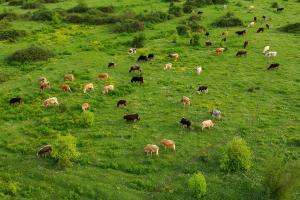TB Movement Restrictions
Information on Restriction of Movement for animals with Tuberculosis.
Why does my herd have to be restricted during a TB breakdown?

Movement restrictions are necessary to reduce the risk of the disease spreading via cattle movements. Remember non-reactor cattle may already be incubating the disease and may pose a risk to other herds. Movement restrictions are also required by legislation.
Once a herd becomes a TB breakdown, movement restrictions are applied, preventing the movement of live cattle out of the herd except for direct slaughter. This means movement to markets or other herds is forbidden. In some cases, movement of animals into the herd may also be restricted.
Restriction notices will be issued to you giving details of the movement restrictions that have been imposed on your herd. These will detail what movements are and are not allowed.
Movements that are blocked by movement restrictions can only take place if a movement licence is approved in advance.
Can I move cattle directly to an abattoir during a breakdown?
Yes - You can take animals, that are not individually restricted, directly to an abattoir in Northern Ireland provided your herd test is not 37 or more days overdue. These movements do not require a licence and can be done via paper or electronic MC2.
Why do some of my animals have an individual TB status against them?
The most common reasons why an animal might have an individual TB status include the following:
- Animal is a reactor or inconclusive
- Animal has missed a test
- Animal has been traced from another breakdown herd and needs a tracing test (CTT) to check for spread of disease from the breakdown herd
If an animal has a TB status on NIFAIS online (NoL) or on your herd list print out, it is individually restricted and may not move (even to slaughter) without a movement licence. These licences are known as MC2L licences. Some MC2LS can be obtained via NIFAIS online (NoL). Licences can also be requested from your local Divisional Veterinary Office (DVO). Please contact your local DVO if you have any queries.
Can I buy in animals during a TB Breakdown?
In most cases animals may be moved into breakdown herds as normal but in certain circumstances moves onto the farm will be restricted:
- Moves in will be automatically restricted if your herd test is 37 or more days overdue
- If your herd has been classified as a ‘Severe TB Breakdown’, a BT25c notice will be issued, to prevent the movement of cattle into the herd. This is to prevent healthy cattle being purchased into a very high-risk situation where they are very likely to become infected. It is an offence to move animals into your herd in breach of a BT25c notice unless advance permission has been given by DAERA. If animals are moved in in breach of this notice and are subsequently removed by DAERA as reactors or NICs, compensation payments may be withheld subject to investigation
What happens if I don’t test on time?
Testing on time reduces the risk of further spread within your herd and helps to get your herd derestricted as soon as possible.
If any herd test is not completed by 37 days after the due date, restrictions will be imposed to prevent all movements to or from your herd until the overdue test is completed. This includes movements into the herd (if not already blocked) and moves directly to slaughter.
Overdue testing can also result in financial penalties as it may be a breach of Cross Compliance Verifiable Standards.
If there are exceptional circumstances, can I request a movement licence to allow me to buy in cattle?
If your herd is restricted from purchasing and there are very exceptional circumstances meaning you need to buy in stock, you should contact your local DVO for advice. They may decide to grant a movement licence to allow the move. For example, permission may be requested if you need to replace your breeding bull.
In most circumstances, we will only consider allowing moves if you can demonstrate the risk of infection spreading to the newly purchased animals is minimal and you have put in place reasonable measures to limit the spread of infection. This would include having completed all the required cleansing and disinfection.
What happens if I don’t have enough feed or housing because I can’t sell cattle?
DAERA understand that movement restrictions may cause difficulties such as the need for extra housing and feed for stock that you would normally have sold, for example, stores or heifers. However, DAERA is not empowered to pay compensation for any consequential losses which you may suffer because you have to hold onto extra animals or change the way you manage your herd. It may be worth checking if these losses are covered under your farm insurance policy.
If there are any approved Alternative Control Herd (ACH) currently available and willing to purchase cattle from you, you can request a movement licence from your local DVO.
Alternatively, in very exceptional circumstances, DAERA may also consider issuing a licence to allow a move to another OTW herd which is not an approved ACH under licence. This requires the approval of the local Divisional Veterinary Officer (DVO). Such moves will only normally be approved into OTW herds and only after an on-farm visit to assess the situation and a detailed risk assessment has been completed. Requests for movement licences will not normally be considered if herd testing is not up to date.
For further information on these options, please contact your local DAERA Divisional Veterinary Office.